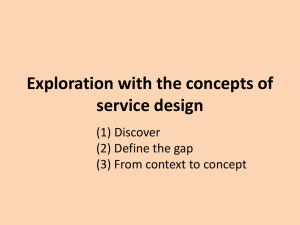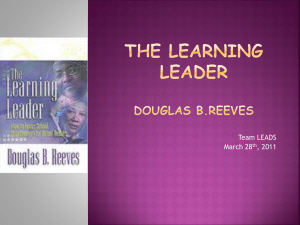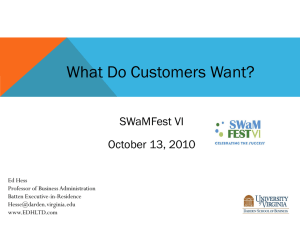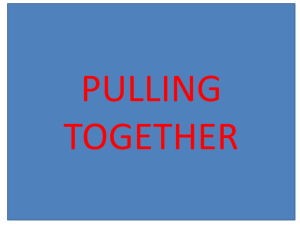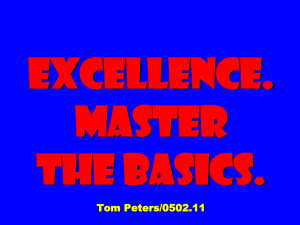Legal and Ethical Issues at a Treatment Centre
advertisement
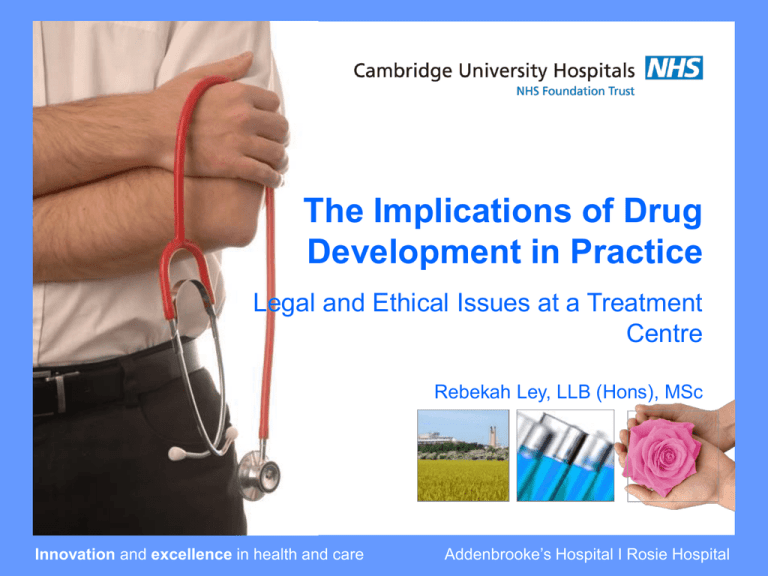
The Implications of Drug Development in Practice Legal and Ethical Issues at a Treatment Centre Rebekah Ley, LLB (Hons), MSc Innovation and excellence in health and care Addenbrooke’s Hospital I Rosie Hospital Introduction • Technology develops quickly, the law changes slowly. • Medicine is practised with a level of uncertainty. • Confrontation: medicine, society and law. • Should medical ethics be formed by the law or the law formed by medical ethics? Innovation and excellence in health and care Introduction • Medicine operates within broadly stated legal. • Move away from the duties of the medical professional towards broad patients’ rights. • Trust and respect between doctor and patient rather than adversarial. Innovation and excellence in health and care Introduction • Loss of control and certainty. • Law and ethics can they help? • Have in mind the non financial barriers that also come into play here in particular international property rights. • Big themes – small answers. Innovation and excellence in health and care Topic 1: Example Lilly is two years old. Her parents count the months as other might not, because each is previous additional time, bought at high cost. She was diagnosed soon after birth with a neuroblastoma. She received early treatment at Addenbrooke’s and was given the all clear in June 2010. Then, unusually in such a young child, she had a sudden and violent relapse. The NHS had nothing further to offer. With the help of their treating oncologist they found the only place in the world offering treatment for children whose neuroblastoma has relapsed and spread across the blood/brain barrier. They took Lilly to the Memorial Sloan-Kettering Cancer Centre in New York for pioneering immunotherapy. The costs of Lilly’s treatment has so far cost her family £610,000. Innovation and excellence in health and care Topic 1: Example • Availability of information varies widely, increasingly digital world with strong parental organisations. • Differing standards for information across the world. • Who is going to provide this information? • As the treating team are you going to let parents and some patients find out and interpret for themselves? Innovation and excellence in health and care Topic 1: Example • What is the nature of the obligation? • Legal obligation: provide care that is in the patient’s best interests. No legal requirement to provide assist. • Moral obligation is wider. Maintaining the therapeutic relationship and the value of this. Topic 2: How to approach families • Carefully! • Sources of information; national and organisations. • NHS Choices provides some advice about seeking treatment within the European Union but nothing specific about treatments outside the European Economic Area. • NHS funding treatment of abroad is variable Innovation and excellence in health and care Topic 2: How to approach families • Unique vulnerability of children as research subjects, being able to express needs and being able to defend their own interests. • Role of parents: decision to participate; thresholds of understanding and complexity of research. • Consent: process not a single event. Longer term studies need to refresh. Child may develop ability to consent. • Classification of risk, high, low and minimal. Innovation and excellence in health and care Topic 2: How to approach families • The discussions around care and treatment options occur in a situation of extreme stress. Parents may feel a lack of control and variable degrees of choice regarding their child participating in a clinical trial. • Informed consent – can parents distinguish between treatment and trial participation? • Researcher different from the treating clinician? Do parents who simply want more time with their child need that differentiation to help them understand the limits of what is being offered? • Losing a sense of normality leading to decisions to accept or not participation in a trial. Innovation and excellence in health and care Topic 2: How to approach families • Child truly as research participant rather than simply a recipient of something that he or she may not understand. • Understanding the mutual obligations that participation in research can bring. • Understanding how research illustrates the expectations and obligations that society places upon us. • A child who can understand the suffering of other children is much more than just a research subject – altruism. • Autonomy and medicine’s humanistic roots. Innovation and excellence in health and care Topic 3: Affordability NICE, evidence, cost/benefit analysis • Affordability or should we look at cost? • In any health economy choices have to be made between options when resources are finite (NHS) or scarce (developing world). • Not really about affordability, can’t judge affordability unless you know the cost. • Opportunity cost – I can’t do y because I am going to do x. • What are the benefits that I am giving up rather than the cost of the thing itself. • Direct, indirect and intangible costs. Innovation and excellence in health and care Topic 3: Affordability NICE, evidence, cost/benefit analysis • NICE limited societal perspective – direct costs versus indirect costs to State. • Benefits: units: years saved or utility units. • Quality Adjusted Life Years (QALYs). • Evidence: Particularly pertinent given the rarity and complexity of childhood cancer meaning the need to travel often long distances and the associated costs. Many countries may not be able to offer some treatments given low volumes. Targeted research on rare tumours genetically analysed can be effective but the numbers are low and could be described as truly experimental. • May be a move away from cost and benefit and instead ask the question what are the added costs over and above those of the existing treatment. Innovation and excellence in health and care Topic 4: Equity in a limited financial climate? • Positivist legal approach to human rights embodied in international law e.g. Universal Declaration on Human Rights and European Convention on Human Rights. • I do not believe there is a legal right to health or healthcare. • Moral right to health and healthcare not an abstract right that is independent of wider societal values. • Example at the beginning: Can’t infer from the empirical fact that because Lilly’s best chance of survival is to travel to New York that she is entitled to it (has a right to it). • The entitlement depends on all the other things we have already talked about, effectiveness (evidence), resources we have and the priority we give to Lilly as opposed to others; opportunity cost again. Innovation and excellence in health and care Topic 4: Equity in a limited financial climate? • The word most often used in association with healthcare it utilitarianism – the greatest amount of good for the greatest number. • Egalitarian: desire to treat equally or fairly. • Fairness as Justice. • Setting a healthcare budget utilitarian general priorities handing the baton to the frontline Egalitarian. • Utilitarian v Egalitarian (Fox or Hedgehog?)….. • Meeting need depends upon evidence and the value placed upon that evidence. Innovation and excellence in health and care Topic 4: Equity in a limited financial climate? • The economics of research – some things to consider: • Knowledge is a commodity; research and development are inputs in the production of knowledge. • Publicly funded Science? An exclusive dependence on the public purse to finance R&D is problematic because no one knows what the end result will be and sometimes not even how to get there. • Technology is market driven and enforced by the law; Science is community driven and thus enforced by norms – to a certain extent then the scientific community here can set the “norms”. Innovation and excellence in health and care Topic 5: Access to drugs in developing countries • The better question is, “how can the good or benefits from medical research be maximised?”. • This is to move away from the overriding concern to protect research participants. • Equal access to the benefits from research (back to egalitarianism). • Sustainability: a way of measuring the benefits and finding ways to improve this. • Asking: “when are inequalities in healthcare across the globe unjust?”. • Obligations on States and International Organisations in setting priorities. Innovation and excellence in health and care Topic 5: Access to drugs in developing countries • Lymphoma more common in Rwanda than the United States. • Rwanda no trained paediatric oncologist. • In the West 80% of children can be cured of lymphoma, this requires diagnosis, chemotherapy and follow-up. • Project twinned Dana-Faber/Children’s Hospital Cancer Center with a hospital in Rwanda to provide care for 10 children with lymphoma. • Five are considered cured, two are in remission, two died from treatment related complications and one from lymphoma which progressed through treatment. Innovation and excellence in health and care Contact details Rebekah.ley@addenbrookes.nhs.uk Innovation and excellence in health and care
